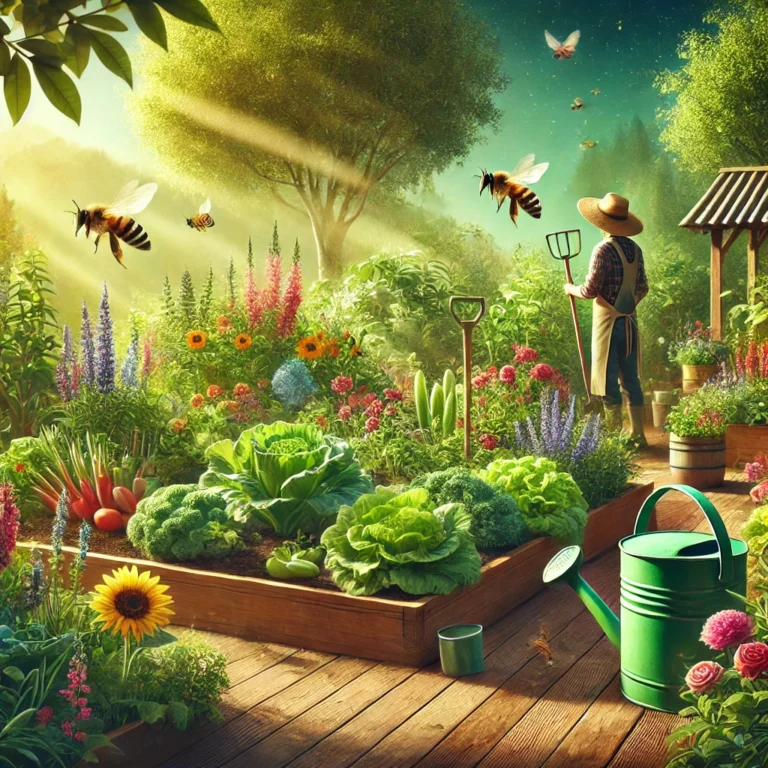Have you ever dreamed of growing your own fresh vegetables, herbs, or flowers—without worrying about harmful chemicals? Organic gardening is the answer! It’s a natural way to garden that’s good for the environment, your health, and your wallet. Whether you have a backyard, a small balcony, or just a few pots, you can start an organic garden today.Let’s dive into the world of organic gardening—what it is, why it’s great, and how you can get started!
What Is Organic Gardening?
Organic gardening means growing plants naturally—without using synthetic pesticides, herbicides, or chemical fertilizers. Instead, it focuses on healthy soil, composting, natural pest control, and biodiversity.Think of it this way: in nature, plants grow beautifully without human-made chemicals. Organic gardening mimics this natural process, allowing plants, insects, and soil to work together in harmony.
Why Choose Organic Gardening?
Switching to organic gardening has many benefits, for both you and the planet!
1. Healthier Food
Vegetables and fruits grown organically don’t have chemical residues, making them safer and more nutritious. You’ll enjoy fresher, tastier produce straight from your garden.
2. Better for the Environment
Chemical fertilizers and pesticides pollute the soil, water, and air. Organic gardening keeps nature clean and thriving.
3. Saves Money
No need to buy expensive chemical products! Compost, mulch, and natural fertilizers are often free or very cheap.
4. Builds Healthy Soil
Healthy soil is the foundation of a great garden. Organic methods help create soil that retains nutrients, drains well, and supports plant growth year after year.
5. Encourages Beneficial Insects
Ladybugs, bees, and earthworms are a gardener’s best friends! Organic gardening attracts these helpful creatures, which help with pollination and pest control.
How to Start an Organic Garden
You don’t need to be an expert to grow an organic garden. Just follow these simple steps:
1. Pick the Perfect Spot
Find a sunny area (at least 6–8 hours of sunlight a day).Make sure the soil drains well and doesn’t stay soggy after rain.If space is limited, use raised beds or containers.
2. Improve Your Soil
Healthy soil = healthy plants! Here’s how to boost your soil naturally:
Compost: Turn kitchen scraps and yard waste into rich, natural fertilizer.
Mulch: Add straw, leaves, or wood chips to keep moisture in and weeds out.
Worms: They aerate the soil and improve its nutrients!
3. Choose Organic Seeds and Plants
Look for organic, non-GMO seeds and seedlings. Avoid plants treated with synthetic chemicals.
4. Water the Right Way
Water early in the morning to prevent evaporation.
Use a drip irrigation system or a watering can to avoid overwatering.
Rainwater collection is a great way to save water!
5. Control Pests Naturally
No chemicals needed! Here are some organic ways to keep pests away:
Companion planting: Plant marigolds near vegetables to repel insects.
Neem oil spray: A natural pesticide that won’t harm beneficial bugs.
Attract ladybugs and birds: They eat aphids and other harmful pests.
6. Rotate Your Crops
Don’t plant the same crop in the same spot every year. Rotating crops prevents pests and keeps the soil rich in nutrients.
Common Mistakes to Avoid
1. Overwatering: Too much water can cause root rot and attract pests.
2. Neglecting Soil Health: If your plants look weak, improve the soil with compost.
3. Not Controlling Weeds: Weeds steal nutrients! Use mulch to keep them down.
4. Ignoring Pest Problems: Check your plants regularly and act fast if you see damage.
5. Planting Too Close Together: Give your plants room to grow so they get enough sunlight and air.
The Future of Farming Starts with You
Starting an organic garden isn’t just about growing food—it’s about embracing a sustainable way of life. By choosing organic methods, you are improving soil health, protecting the environment, and ensuring a healthier future for the next generation of farmers. Whether you’re tending to a small vegetable patch or managing acres of farmland, every step toward organic gardening brings us closer to a more sustainable food system.
If you’re an aspiring farmer, your journey begins in the soil. With patience, care, and the right organic practices, you’ll cultivate not only crops but also a thriving ecosystem. The land will reward you with fresh, chemical-free produce and the satisfaction of knowing you’re farming the right way—naturally.
